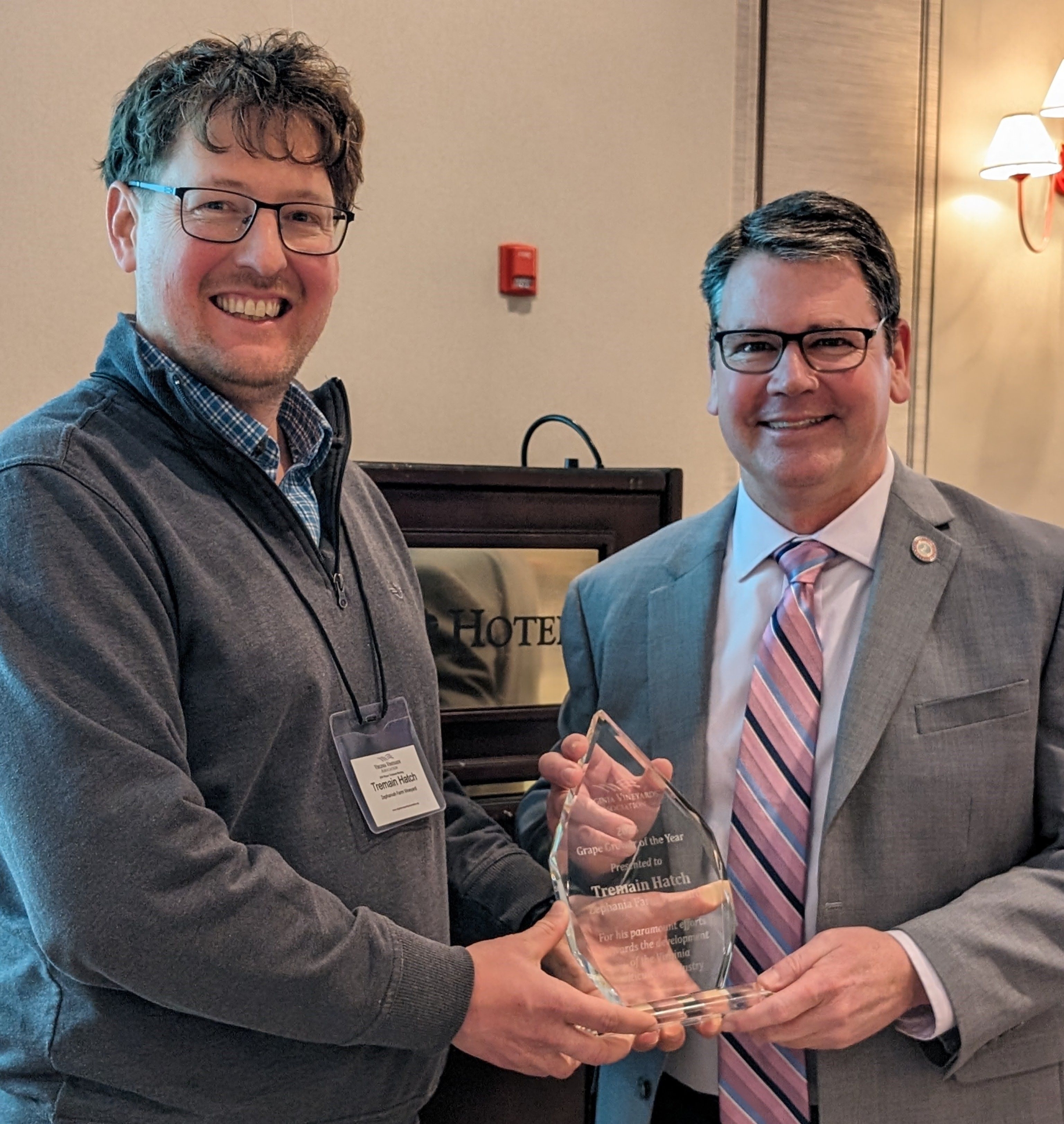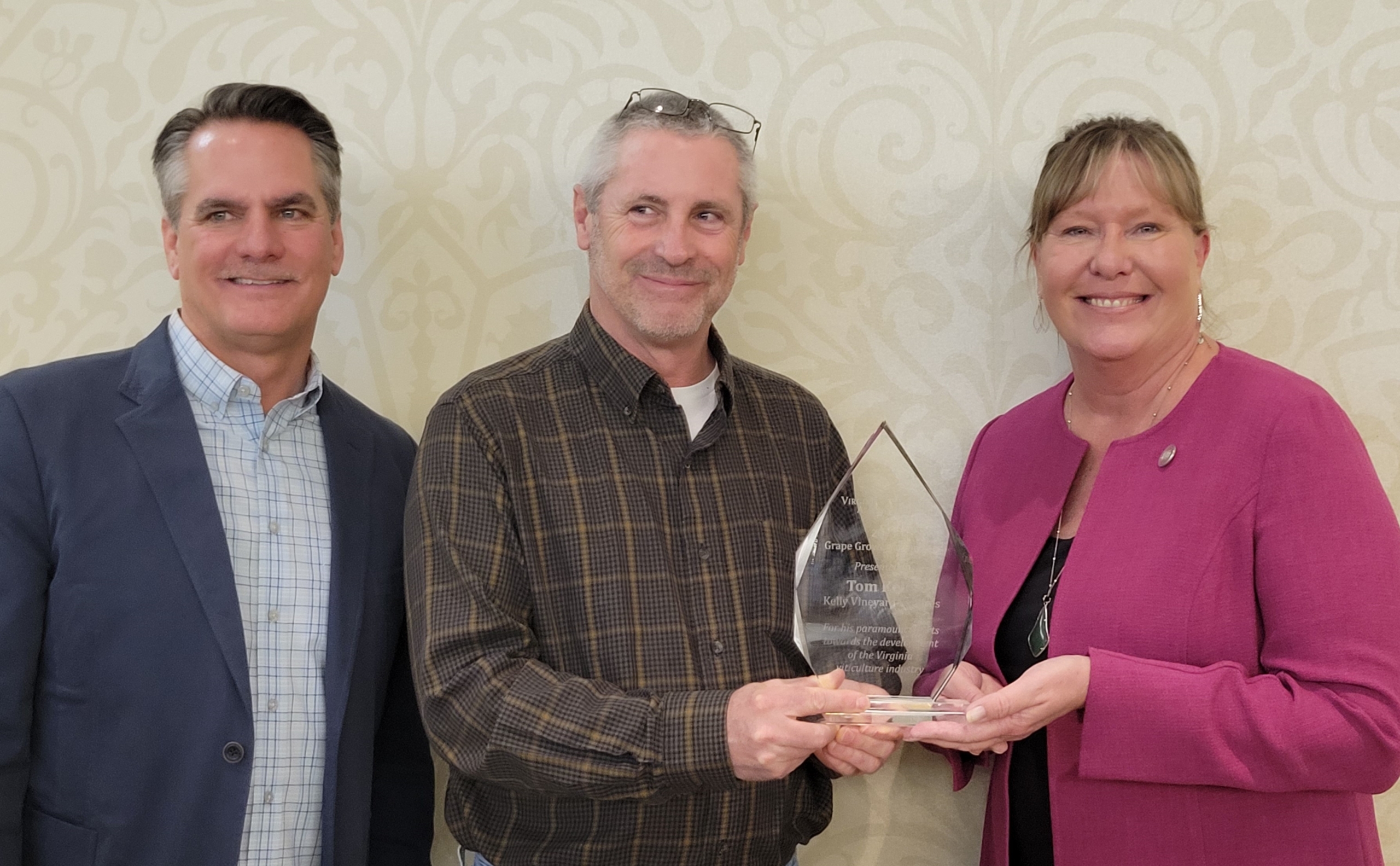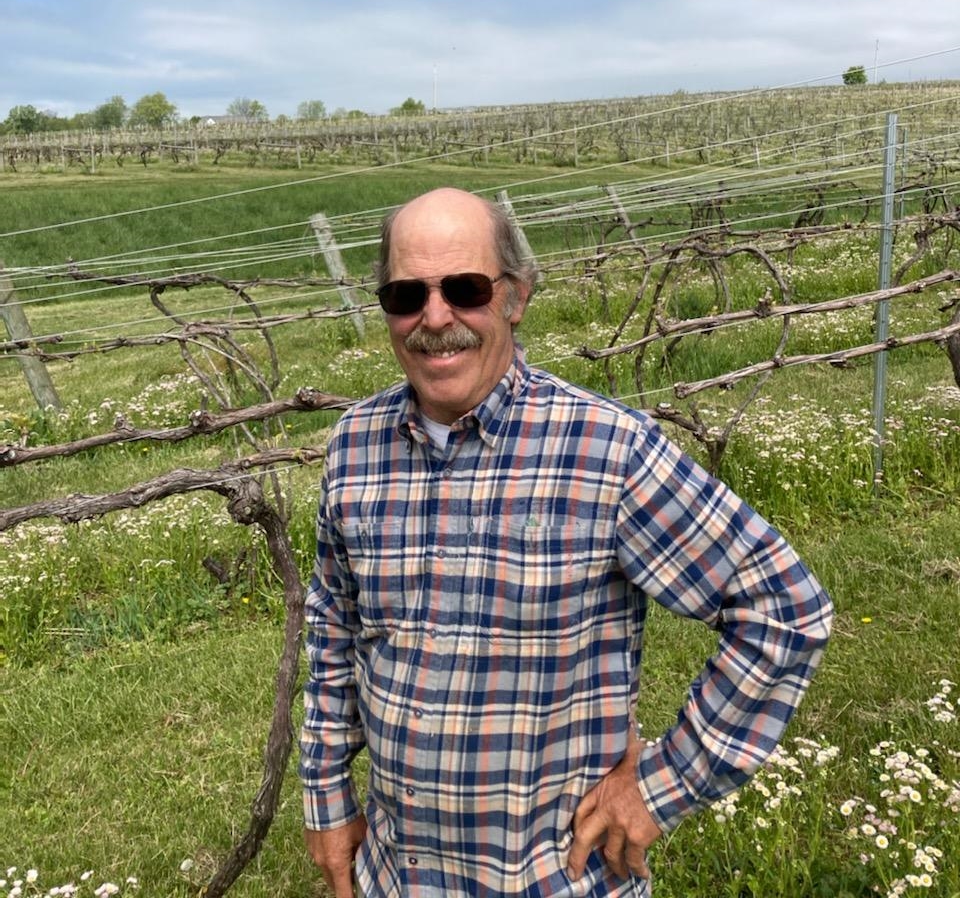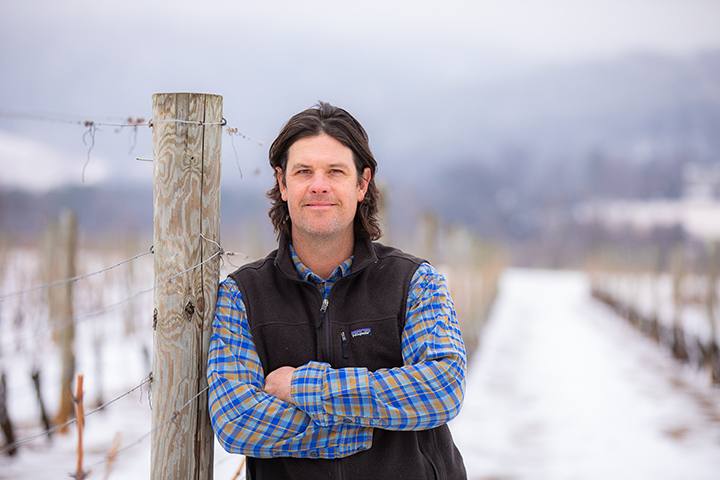VVA AWARD NEWS
2024: VVA Honors Tremain Hatch With Grower of the Year Award

Tremain Hatch, left, receives the VVA Grower of the Year Award from Matthew Lohr, Virginia Secretary of Agriculture and Forestry.
CHARLOTTESVILLE – The Virginia Vineyards Association on Wednesday honored Tremain Hatch, a respected viticulturist, educator and researcher, as its Grower of the Year. The award recognizes Tremain’s work to advance the Commonwealth’s wine grape industry as both viticulture research and extension associate at Virginia Tech and viticulturist at his family’s Zephaniah Farm Vineyard.
“Congratulations to Tremain Hatch on being named the Virginia Vineyards Association’s Grower of the Year,” said Virginia Secretary of Agriculture and Forestry Matthew Lohr, who presented the award at the VVA’s annual Winter Technical Meeting. “He has been involved in the industry since he was a teenager and has become one of the most respected viticulturists in the state. His determination and drive have helped Virginia’s wine industry to thrive and become a tremendous economic driver for the Commonwealth.”
“Tremain has not only worked at and managed his family’s vineyard at Zephaniah for more than a decade, but he is a reliable resource for so many of us who work in the vineyard,” said AJ Greely, president of the VVA. “From his work at Virginia Tech to his participation as a member of the Sentinel data collection and analysis project to the assistance he provides the VVA at each of our technical meetings, Tremain has put his stamp on the Virginia viticulture industry.
“We’ve all come to know his smile and his engaging way,” she added. “Not only is he a standout for his work at Zephaniah but having him in our industry is a benefit for all of us. He is more than deserving of this award.”
Dr. Tony Wolf, a renowned viticulturist at Virginia Tech who was a driving force in the Virginia wine industry for over 35 years, recalled hiring Tremain twice: once as a field and lab assistant prior to his acceptance in the graduate program at Tech, and again as a viticulture research and extension associate after he completed the master’s program.
“Tremain has the perfect combination of excellent work ethic, viticultural knowledge, and personal demeanor that makes him an excellent extension educator,” Tony said. “Tremain knows how to grow high-quality grapes, and he is more than willing to share that knowledge with others. He is entirely deserving of the prestigious Grower of the Year Award.”
Dr. Mizuho Nita, who heads the Grape Pathology Department where Tremain works, said, “I’ve known Tremain since I joined Virginia Tech in 2009, and his expertise in viticulture and vineyard operations has been incredibly helpful in many extension-related projects,” including evaluations of protective materials for vines.
Last year, Mizuho said, Tremain accompanied him on a trip to Japan where they held seminars, workshops, a Virginia wine-tasting session and a dozen in-field consultations. “We had the opportunity to interact with over 200 growers in three weeks,” he said. “As a result, Tremain is now a well-known viticulturist in Japan, too.”
In 2002, Tremain was a senior in high school when he helped plant the first acre of vines on his family’s 400-acre farm in Loudoun County. Zephaniah’s vineyard has since grown to 10 acres with 18 grape varieties, and Tremain continues to participate as consulting winemaker and viticulturist. More recently, he has also begun consulting for several area vineyards.
Tremain earned a master’s degree at Virginia Tech in 2010. His master’s research dealt with assessing the response of Cabernet Sauvignon to various means of restricting vegetative development and included an assessment of the impact of those practices on wine quality.
That year, he also became a viticulture extension associate at Virginia Tech’s Alson H. Smith Jr. Agricultural Research and Extension Center at Winchester, where his responsibilities have included vineyard troubleshooting, site evaluation, and responding to requests from growers and aspiring growers for viticultural assistance. Currently, his research focuses on evaluating protective culture in vineyards and seedless table grape evaluations.
Prior to joining Virginia Tech, he spent seven months working at Barboursville Vineyards, Barboursville, where he said he learned to appreciate the work required to sustain a large wine operation producing high-quality wines. He also gained viticulture experience working in Marlborough, New Zealand, in 2009, and in Alto Adige, Italy, in 2006.
He lives in Winchester with his wife, Gretchen, and his two children.
2023: Tom Kelly Named Grower of the Year

From left: VVA President Skip Causey, VVA Grower of the Year Tom Kelly and Virginia Deputy Secretary of Agriculture and Forestry Beth Walker Green.
CHARLOTTESVILLE, Va. – Tom Kelly, a longtime vineyard manager and consultant, as well as a former president of the Virginia Vineyards Association (VVA), has been named wine grape Grower of the Year by the VVA. The award was presented Feb. 17 by Beth Walker Green, Virginia Deputy Secretary of Agriculture and Forestry, at the VVA’s 2023 Technical Meeting in Charlottesville.
“Congratulations to Tom Kelly on being named the VVA Grower of the Year,” said Secretary of Agriculture and Forestry Matthew Lohr in a statement to the VVA. “Since beginning his career in 1989, he has grown as a viticulturist, provided insight to counterparts, led the VVA, and volunteered his expertise when needed.”
Secretary Lohr added: “This type of leadership and commitment has helped Virginia’s wine industry grow and thrive in the tenth-ranked wine producing state in the nation. The industry is a tremendous economic driver for the Commonwealth as it provides a $1.73 billion boost to the state’s economy and creates more than 10,000 jobs.”
Tom, of Strasburg, Va., has been involved in viticulture for 25 years as a vineyard worker, vineyard manager and consultant, managing the planting of more than 70 acres of vines over the course of his career. He is currently vineyard manager at Rappahannock Cellars in Huntly, Va., an award-winning winery growing 30 acres of wine grapes.
Tom served on the VVA Board of Directors for ten years, including two terms as association president from 2013 to 2016. As president, he tackled a number of issues of concern to the wine industry, including finding ways to help small vineyards become more profitable.
Current VVA President Skip Causey said that when he first joined the VVA Board he was struck by the role Tom played in helping new board members, like himself, ease into their roles.
“He has served tirelessly on the board and several of its committees,” Skip said. “He has a deep understanding of viticulture, and he knows how to help the entire industry grow and prosper. We all owe a debt of gratitude to Tom Kelly for what he has done to help the industry.”
Tom said his “greatest reward” in volunteering for the VVA came from the people that he got to know. “We had this project and that project, and we put on some really great meetings,” he said. “Those are all things to be proud of. But what I got out of it more than anything else were the relationships with people. That’s what the VVA really meant to me – the wonderful people.”
He began his viticulture career in 1989 at Sand Castle Winery in Erwinna, Pa., at a time when he “was looking for something different” to do. He came across an ad for the vineyard, which he thought “seemed different enough.”
“My new employer handed me a hoe and put me in the fields where I’ve been ever since,” he said. “I knew nothing about grapes or wine at the time, but I fell in love with the whole process.”
Tom said that during his three-year stay at Sand Castle, he learned the basics of viticulture, from pruning and hilling up to canopy management and harvesting, and was introduced to winemaking. He then entered the Virginia wine industry, working at Oasis Vineyards in Hume and then Totier Creek Vineyards (now Thatch Winery) in Charlottesville, where he spent four years as vineyard manager and assistant winemaker.
In 2004, he was named vineyard manager at Rappahannock Cellars, which then had a total of 22 acres of vines on three separate sites. With the birth of his son in 2013, Tom left Rappahannock to form his own consulting firm, Kelly Vineyard Services. While he continues to serve clients as a consultant, he resumed his role as vineyard manager at Rappahannock in November 2019.
The Grower of the Year Award comes as the VVA marks its 40th year of service to the industry. “These forty years of sharing information, research, and best practices has helped improve the quality of Virginia grapes and Virginia wine,” Skip said. “Today, the VVA is stronger than ever, and we are continuing to serve the Commonwealth’s vineyards and their more than 5,000 acres of vines.”
2022: Shepherd Rouse Named Grower of the Year

Shepherd Rouse, owner of Rockbridge Vineyard and Brewery in Raphine, has been named Grower of the Year by the Virginia Vineyards Association (VVA). The award was announced May 12 by Virginia Secretary of Agriculture and Forestry Matthew Lohr at the VVA’s 2022 Technical Meeting in Charlottesville.
“Virginia’s wine industry is a tremendous asset for the Commonwealth as it contributes $1.37 billion to the state’s robust economy, while also creating more than 8,200 jobs. Virginia is also one of the most dynamic wine-producing states in the U.S., with more than 28 varieties of grapes planted on more than 4,000 acres across the Commonwealth,” said Secretary Lohr. “For more than three decades, Shepherd has been one of the true pioneers of Virginia’s wine industry. He started and expanded his vineyard, produced a number of award-winning wines and stands readily available to assist others in the wine and vineyard industry.”
Shep’s love for wine first developed when he was a college student traveling in Germany in 1974 and had the opportunity to sample that country’s Riesling wines. He became a big fan of sweet German wines but didn’t develop a taste for dry red wines until a second visit several years later.
After graduating from Washington & Lee University, Lexington, Va., with a degree in geology and biology, he returned to Germany on a Fulbright Scholarship and participated in the 1977 harvest in the Rheingau and Baden wine regions. At the end of that stay, he visited a friend in Florence, Italy, and they had Chianti with their lunch every day. That exposure to red wine made a lasting impression on him, he said. He moved to California in 1978 and spent eight years there working in vineyards and attending classes at the University of California, Davis where he earned a master’s degree in enology.
Returning to Virginia, Shep said he and his wife, co-owner Jane Millott-Rouse, found the perfect vineyard site in northern Rockbridge County. In 1989, he planted his first vines—five acres of Vidal grapes. “Then I realized that if you’re going to buy a tractor and sprayer and all the other equipment you need, you’d better have enough vines to justify the cost,” he said.
He continued to expand the vineyard, and today his 17 acres are planted with seven different grape varieties complemented with fruit from other top-quality growers in neighboring counties. His wines are made from vinifera grapes such as Chardonnay and Riesling, hybrids such as Chambourcin and Vidal, and native American grapes such as Concord. All told, Rockbridge produces about 6,000 cases of wine a year.
“Everyone in the Virginia wine and vineyard industry knows and respects Shep and what he does,” VVA President Skip Causey said. “I think the person who summed it up best is the woman who answered the phone when I called Shep at the winery. ‘He’s not here right now but I am sure he is in the vineyard,’ she said. ‘He is always in the vineyard.’
“I chuckled because that’s who Shep is,” Skip added. “He keeps his head down and works hard in the vineyard and the winery to make some great wines.”
Shep said his goal is to produce wines which please a broad range of individual tastes, explaining that his winemaking style of using traditional small-batch methods with minimal processing allows him to capture the essence of the vineyard in the glass.
Rockbridge wines have won numerous awards, including the Virginia Governor’s Cup on two occasions, and his 2018 V d’Or dessert wine was honored this year with placement in the prestigious Virginia Governor’s Cup Case — the fourth time his wines have received that honor. He has also won Best in Show in the Atlantic Seaboard Wine Association Wine Competition and Best in Show in the Town Point Virginia Wine Competition.
2021: Carrington King Named Grower of the Year

Carrington King, vineyard manager and co-owner of King Family Vineyards, Crozet, Va., has been named Grower of the Year by the Virginia Vineyards Association (VVA). The award was presented to Carrington by Virginia Secretary of Agriculture and Forestry Bettina Ring during the VVA’s annual Winter Technical Meeting, which was held online Feb. 25-26.
“Virginia is one of the most dynamic wine-producing states in the U.S., with more than 28 varieties of grapes planted on more than 4,000 acres in the Commonwealth. Carrington King exemplifies the spirit that is bringing Virginia to the forefront of the American wine industry,” Secretary Ring said in presenting the award. “Over the course of more than two decades, he has overseen the growth of King Family into one of the Commonwealth’s largest vineyard operations.”
Under Carrington’s management, King Family has expanded to 50 acres, including 20 acres on an adjacent property that he also manages full-time. A producer of award-winning wines, King Family has been included in the Virginia Governor’s Cup Case, which showcases the Commonwealth’s best wines, in seven of the past nine years.
“Carrington is one of the most experienced and professional vineyard managers in Virginia,” said Skip Causey, who assumed office as the VVA’s new president during the same meeting. “He’s been a leader in handling the challenges of weather, employing helicopters and wind machines, for example, to protect his vines from late spring frosts.”
Carrington has worked at King Family Vineyards since its founding in 1998, helping to plant eight acres of Merlot and Viognier vines while he was still in high school. “We ordered the vines when I was 18 years old, and I was 19 by the time we started planting,” he recalled. “During the fall, I would come home from college on the weekends to work in the vineyard. And back then, we did everything by hand – all the leaf pulling, all the hedging, and all the canopy management. We didn’t use grow tubes. We trained every vine by hand.”
Carrington said he learned valuable lessons about managing a vineyard from his father, the late David L. King, who was a prominent force in the Virginia wine industry. “He was always about doing the work and getting out there and being a leader,” Carrington recalled. “Don’t go sitting in the house and direct people from there. Get out there, and do the work with them, and they’ll be inspired to treat the ground and the vineyard like it’s their own.”
The vineyard and winery are truly a family operation, he said, noting, “This is a team effort every single day. My brothers, James and Stuart, have been with me every step of the way, so this is very much a shared honor.”
In addition to the Merlot and Viognier that made up the initial planting, King Family now grows Chardonnay, Cabernet Franc, Petit Verdot, Petit Manseng, and Malbec.
Carrington, a former member of the VVA Board, continues to serve Virginia growers by participating in the Legislative Collective, which represents the interests of the Commonwealth’s vineyards and wineries.
He graduated from the University of Maryland in 2002 with a degree in horticulture, and lives in Crozet with his wife, Corie, and their three daughters. Carrington, who played lacrosse in high school and college, coaches youth lacrosse teams in Charlottesville.
Photo of Carrington by Jack Looney
2020: Carl Tinder Named Grower of the Year
CHARLOTTESVILLE, Va. (Feb. 21, 2020) — Carl Tinder, owner of Tinder Cattle & Vineyard in Earlysville, has been named Grower of the Year by the Virginia Vineyards Association (VVA).
Mr. Tinder has become an important force in the growth of Virginia’s wine industry, said VVA President Nate Walsh. “In addition to planting 32 acres of vines on his own properties, Carl has helped numerous other growers plant and maintain thriving vineyards in Central Virginia, providing fruit for some of our most expressive wines,” Nate said.
Virginia Secretary of Agriculture and Forestry Bettina Ring presented the award to Mr. Tinder at the VVA’s annual Winter Technical Meeting on Feb. 21. “Carl Tinder has played a vital role in Virginia’s growing wine industry,” Secretary Ring said. “His company has planted over 275,000 vines in Virginia and, in 2019, his harvest service picked and delivered over 400 tons of fruit to multiple wineries.”
In 1995, after graduating from Virginia Tech with a BS in Animal Science and a minor in Agricultural Economics, Carl began managing Adventure Farm in Earlysville, Va., for Mary Jane Chisholm. At the time, Adventure Farm was a 1,100-acre cattle and timber operation that was later expanded to over 4,000 acres.
In 2005, encouraged by Felicia Rogan of Oakencroft Vineyard and Winery, Carl planted two acres of vines on family property in Nelson County that is now known as Grape Lawn and, in 2006, he planted four acres of vines at the Adventure Farm site. Today, those vineyards have grown to 20 acres and 12 acres, respectively.
In 2010, he worked with well-known viticulturist and consultant Chris Hill to plant and install a vineyard at Pippin Hill, which, he said, inspired in him a passion to help other growers. Carl began providing services to new and established vineyards and, in 2014, he began operating as Tinder Cattle & Vineyard, a full-service vineyard management company that has planted over 275,000 vines.
Mr. Tinder expressed optimism about the future of Virginia wine. “Tinder Cattle & Vineyard looks forward to servicing the vineyard industry of central Virginia for years to come and to a 2020 vintage that continues to show the world what Virginia has to offer,” he said.
“We followed an internet recipe, and made a crabapple wine that wasn’t half bad,” he said, adding that they followed up that experiment by making different types of fruit wines until they eventually moved to wine grapes, “and, we were hooked.”
2019: Karl Hambsch Named Grower of the Year
CHARLOTTESVILLE, Va. (Feb. 22, 2019) — Karl Hambsch, the first grower in the Commonwealth to obtain organic certifications for both a vineyard and a winery, has been named Grower of the Year by the Virginia Vineyards Association (VVA). Virginia Secretary of Agriculture and Forestry Bettina Ring presented the award to Karl Friday at the VVA’s annual Winter Technical Meeting.
“With more than 300 wineries now in the Commonwealth, Virginia’s wine industry continues to grow, break new ground and plant the innovative seeds for future success,” she said. “Karl Hambsch exemplifies these traits, and his path to becoming Grower of the Year was a winding one. From history student to providing fruit for making jelly to wine maker, and ultimately to creating Virginia’s first certified organic vineyard and winery, Karl’s innovative spirit, determination, and creative thinking have contributed to his success and this well-deserved honor.”
Karl started what would become Loving Cup Vineyard & Winery in 2007 with a small test block of vines planted on the 150-acre family farm in North Garden where he grew up. “The hollow has changed quite a bit in 30 years, but it is the memory of that unspoiled ‘wilderness’ that inspires us to farm better,” Karl said. “We bring with us a commitment to be responsible to our neighbors, our community, our watershed, and beyond.”
By its first harvest in 2012, Loving Cup had three acres of grapes under vine. Today, the vineyard has grown to five acres and includes three grape varieties: Cayuga White, Marquette, and Corot Noir.
VVA President Nate Walsh described Mr. Hambsch as a pioneer in the development of forward-thinking Virginia winegrowing. “Karl represents the bold spirit of innovation and experimentation that is helping to push Virginia forward as a wine region,” Nate said. “In addition to making great wine, he has also been a source of inspiration and advice for others entering the winegrowing business.”
Karl has been a member of the Virginia Vineyards Association since 2005 and served the association as Secretary for one term. He has also been an unstinting contributor to Virginia Cooperative Extension’s “New Grower Workshops” and vineyard field meetings, said Virginia Tech Professor Tony Wolf, viticulturist and Director of the Alson H. Smith Jr. Agricultural Research and Extension Center. “While Karl will be the first to admit that organic grape production is extremely challenging and not for the faint-hearted, his natural curiosity and acquired knowledge of his vineyard’s ecology is a model for others to help understand the complexity of pest management, whether it’s conventional pest management or organic pest management,” Tony added.
Karl majored in history at James Madison University but learned about viticulture and winemaking while working at Prince Michel Vineyard & Winery and Veritas Vineyard & Winery. He said his journey into winemaking began with a crabapple tree on the farm that had provided fruit for a friend to make jelly. When that friend was too busy one year to make jelly, Karl and his father, Werner, decided to use it in a different way.
“We followed an internet recipe, and made a crabapple wine that wasn’t half bad,” he said, adding that they followed up that experiment by making different types of fruit wines until they eventually moved to wine grapes, “and, we were hooked.”
VVA Growers of the Year
Since 2005, the Virginia Vineyards Association has been pleased to honor one of its members with the annual Grower of the Year Award, which is presented at our Winter Technical Meeting. The recipient must be an active member of the VVA with at least seven years of experience managing or operating a commercial vineyard of at least five acres. The nominee must be an active participant in the Virginia viticulture community with a track record of service to our industry, and the nominee must have the respect of his or her peers.
Lifetime Achievement Awards
The VVA presents the Lifetime Achievement Award once every five years to an individual who has made significant and lasting contributions to Virginia viticulture.
